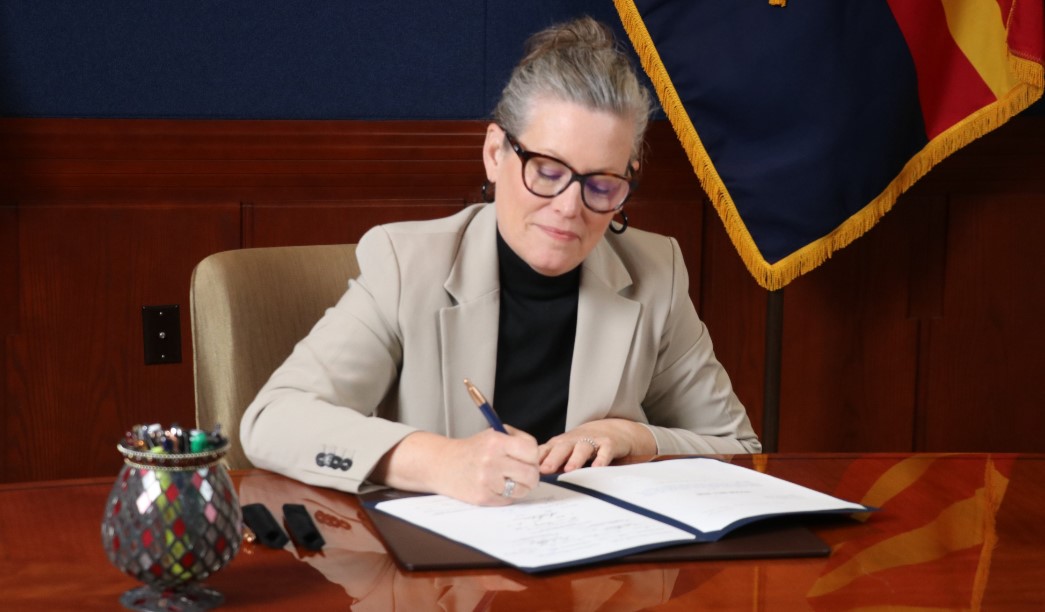
by Jonathan Eberle | Apr 27, 2025 | News
By Jonathan Eberle |
Governor Katie Hobbs has signed SB 1585 into law, a measure that strengthens Arizona’s legal tools for prosecuting child sexual predators. The legislation, introduced by Senate Majority Leader Janae Shamp (R-LD29), received unanimous support in the legislature and directly addresses a legal loophole that had hindered prosecutions in recent undercover sting operations.
The new law modifies the definition of a Dangerous Crime Against Children (DCAC) to include crimes committed against someone posing as a minor—specifically when the defendant knew or had reason to believe that the individual was under the age of 15. Previously, a 2023 Arizona Court of Appeals ruling created ambiguity around whether offenders caught in stings targeting fictional victims could be prosecuted under the DCAC statute.
The change comes in response to two recent undercover operations led by the Pinal County Sheriff’s Office, during which 20 adults were arrested over a four-week period for allegedly attempting to lure minors for sexual activity. However, due to the appeals court’s interpretation of existing statutes, several cases could not be charged as DCACs, limiting the penalties available to prosecutors.
“This legislation closes a dangerous loophole,” said Shamp in a statement. “If a pervert is caught trying to solicit sex from a child by an undercover police officer, the offender deserves to be thrown behind bars—regardless of whether or not an actual child was present.”
Shamp credited Pinal County Attorney Brad Miller for bringing the issue to her attention. Miller emphasized the importance of equipping prosecutors with clear, enforceable laws to hold predators accountable. Under current DCAC guidelines, offenders face harsher penalties, including longer mandatory minimum prison sentences.
SB 1585 passed with bipartisan support, signaling widespread agreement among lawmakers that the legal ambiguity identified in the appellate court ruling needed to be addressed. While sting operations remain a key strategy in identifying potential abusers before they can harm actual children, legal experts had cautioned that unclear language in the law could undermine these efforts.
Now, with the signing of SB 1585, Arizona prosecutors will be empowered to charge offenders caught in these operations with DCAC-level offenses, provided that the defendant reasonably believed the victim to be underage.
The legislation reflects a broader trend in Arizona and across the country toward strengthening criminal penalties for child exploitation and digital predation. States have increasingly looked to clarify statutes around internet-based luring and sting operations to stay aligned with evolving law enforcement practices.
Senator Shamp framed the passage of the bill as a clear statement: “Arizona has zero tolerance for this evil against our kids.”
Jonathan Eberle is a reporter for AZ Free News. You can send him news tips using this link.

by Jonathan Eberle | Apr 26, 2025 | Economy, News
By Jonathan Eberle |
California is poised to lose a significant portion of its oil refining capacity by the end of 2026, as Valero announced the closure of its Benicia refinery—its second largest in the state—just months after Phillips 66 declared plans to shut down its Los Angeles facility. Together, the closures will eliminate roughly 17.4% of California’s total refining output, a shift expected to ripple beyond state borders, potentially triggering gasoline price spikes and supply disruptions in neighboring Arizona and Nevada.
These developments come on the heels of new state regulations introduced under Governor Gavin Newsom, which impose strict oversight on refinery operations. The rules limit when refineries can conduct maintenance, mandate increased inventory storage, and aim to curb perceived “price manipulation.” However, the energy industry and regional leaders argue these measures are accelerating refinery shutdowns and undermining fuel stability across the Southwest.
California operates as an “energy island,” with limited ability to import refined fuel from other U.S. regions due to the federal Jones Act, which restricts domestic shipping to U.S.-built and -crewed vessels. With U.S. shipbuilding capacity far behind that of countries like China, domestic maritime transport remains scarce and costly. As a result, California will increasingly rely on foreign tanker ships for fuel imports—an emissions-intensive, volatile, and expensive solution.
Governor Newsom claims California’s high gas prices are due to refinery “price gouging,” despite his own administration’s lack of evidence. His regulatory push has faced bipartisan opposition, including a joint letter from Arizona Governor Katie Hobbs and Nevada Governor Joe Lombardo warning that new refinery laws could lead to “higher costs for consumers” in all three states. Chevron echoed this concern, stating that the regulations would increase both the likelihood and duration of fuel shortages, while permanently raising consumer prices.
Refineries in California are already operating at or near full capacity. With no new facilities planned—especially as the state pushes to ban new gas-powered car sales by 2035—any closure tightens supply margins. The upcoming shutdowns will reduce daily refining capacity to 1.34 million barrels, well below the state’s consumption level of 1.8 million barrels per day, necessitating a shortfall of over 140 million barrels per year.
Due to California’s requirement for a specialized gasoline blend, few out-of-state refiners can meet demand, further narrowing supply options. These vulnerabilities were recently exposed when the temporary shutdown of the Martinez refinery sent gas prices soaring across the region, including in Arizona and Nevada.
With California gas prices already the nation’s highest—averaging $4.86 per gallon—experts warn that future supply shocks could bring about even more dramatic volatility and potential fuel shortages across the Southwest.
Jonathan Eberle is a reporter for AZ Free News. You can send him news tips using this link.

by Jonathan Eberle | Apr 24, 2025 | Economy, News
By Jonathan Eberle |
Despite recent claims of financial strain, Arizona cities are experiencing robust revenue growth, according to the Arizona Tax Research Association’s (ATRA) April 2025 newsletter. The report highlights that municipalities have accumulated substantial cash reserves, even as some city officials advocate for tax increases.
ATRA’s analysis reveals that for Fiscal Year (FY) 2025, Arizona cities collectively budgeted $9.1 billion for their general funds, with nearly $4.2 billion—approximately 47%—allocated to cash reserves. This financial strength is attributed to consistent growth in sales and income tax revenues, bolstered by legislative changes and economic factors.
A significant contributor to this revenue surge is the 2019 Wayfair legislation, which enabled Arizona to tax remote sales. This change led to a substantial increase in sales tax collections, with shared revenues to cities rising over 55% from $589 million in FY 2020 to $915.5 million in FY 2025. Projections indicate this figure will reach $918 million in FY 2026.
In addition to sales taxes, cities benefit from Urban Revenue Sharing (URS), which distributes a portion of state income taxes based on collections from two years prior. In FY 2025, URS allocations amounted to over $1.26 billion. However, this represents a 19% decrease from the previous year, primarily due to the implementation of a 2.5% flat income tax rate in FY 2024. To mitigate the impact on municipalities, the state increased the shared percentage from 15% to 18%.
Despite these strong revenue streams, some city leaders cite recent state tax reforms—such as the 2021 personal income tax cut and the elimination of taxes on residential rents—as reasons to consider raising local taxes. ATRA cautions against this approach, emphasizing the importance of prudent fiscal management and the existing financial cushion that many cities possess.
The association’s findings suggest that while state-level tax policy changes have influenced revenue dynamics, Arizona cities continue to enjoy a favorable financial position. As discussions around taxation and budgeting persist, ATRA advocates for transparency and accountability in municipal fiscal practices.
Jonathan Eberle is a reporter for AZ Free News. You can send him news tips using this link.

by Jonathan Eberle | Apr 23, 2025 | News
By Jonathan Eberle |
Despite opposition from local leaders and community organizers, Governor Katie Hobbs has signed SB 1543 into law, a move that will significantly curtail the ability of residents in cities like Scottsdale to refer zoning decisions to the ballot. The legislation, which passed the Arizona Legislature along party lines earlier this month, takes aim at local control.
The law applies retroactively, nullifying a referendum effort by nearly 27,000 Scottsdale residents who had petitioned to challenge a city council-approved expansion plan by public safety technology company Axon. The referendum would have placed the matter on a future citywide ballot, giving voters the opportunity to weigh in on the project’s future.
In a letter sent to Governor Hobbs prior to her decision, Scottsdale Mayor Lisa Borowsky and the full City Council warned that SB 1543 “undermines the principles of local control that are foundational to Scottsdale’s governance” and “sets a dangerous precedent.” The city emphasized that the referendum effort was not a protest against development, but rather a call for public input on a high-impact zoning change.
The controversy began after the Scottsdale City Council voted in November 2024 to approve Axon’s expanded development plans. While the company’s previously approved headquarters from 2020 remains intact, the new proposal includes nearly 2,000 multifamily residential units; over 400 hotel rooms; and approximately 47,000 square feet of retail and restaurant space.
Many residents argued that the expansion warranted broader community input, prompting a grassroots petition drive that garnered tens of thousands of signatures. However, with SB 1543 now law, the referendum effort has been invalidated, and Scottsdale voters will not have the opportunity to decide on the matter at the ballot box.
SB 1543 removes the ability of residents in cities of certain sizes—including Scottsdale—to challenge zoning decisions. Supporters, including Republican legislative leaders, say the law clears the way for large-scale development projects and reduces delays caused by ballot initiatives. Critics, however, argue it silences community voices and weakens the checks and balances that local governments rely on.
City leaders have expressed concern that the legislation fails to address critical issues related to growth, including increased traffic and infrastructure strain. “These are not abstract issues—they impact the daily lives of our residents,” the city wrote in its plea to the Governor.
With the law now enacted, Scottsdale is weighing legal and procedural responses to preserve local authority, while other municipalities watch closely to see how the law will be implemented and challenged.
Jonathan Eberle is a reporter for AZ Free News. You can send him news tips using this link.

by Jonathan Eberle | Apr 23, 2025 | News
By Jonathan Eberle |
Arizona Governor Katie Hobbs has signed Senate Bill 1424, known as the Master Sgt. Orlando Dona Stolen Valor Act, into law. The legislation makes it a criminal offense in Arizona to falsely claim military service or honors for personal or political gain.
The bill, which received bipartisan support in the legislature, takes effect 90 days after the legislative session adjourns. With the governor’s signature, Arizona joins a growing number of states adopting “Stolen Valor” laws that aim to protect the integrity of military service and ensure that those who have sacrificed for their country are not disrespected by fraudulent claims.
Under SB 1424, it will be a misdemeanor offense in Arizona to misrepresent oneself as a member or veteran of the United States Armed Forces or to claim military awards, medals, or other honors that were never earned—particularly when done to obtain benefits, employment, or political advantage.
The law is named after Master Sergeant Orlando Dona, a highly decorated veteran and advocate for military integrity. Dona and others have pushed for greater accountability in how military service is portrayed, particularly by public figures and candidates seeking office.
The bill specifically targets individuals who exploit military service for tangible or reputational gain, such as campaign credibility, financial advantages, or public recognition. Supporters say the law will help restore trust in veteran communities and honor those who have served honorably.
The issue of “stolen valor” has drawn increasing attention in recent years, as social media and public scrutiny have exposed multiple cases of individuals falsely claiming service, rank, or military decorations. While federal law—under the Stolen Valor Act of 2013—prohibits false claims of military awards for monetary gain, SB 1424 strengthens state-level enforcement and expands the law to cover a broader range of deceptive conduct.
Military families and veterans’ advocates have praised the signing, noting the damage such lies can cause to the credibility and honor of legitimate service members.
The bill has drawn support from across the political spectrum, including lawmakers, veterans’ groups, and watchdog organizations dedicated to exposing fraudulent military claims.
The law is expected to be enforced by local jurisdictions and could involve penalties such as fines or jail time, depending on the severity of the offense.
As Arizona takes a firm stance against misrepresenting military service, advocates hope the measure will deter future abuse and serve as a model for other states still considering similar legislation.
Jonathan Eberle is a reporter for AZ Free News. You can send him news tips using this link.





